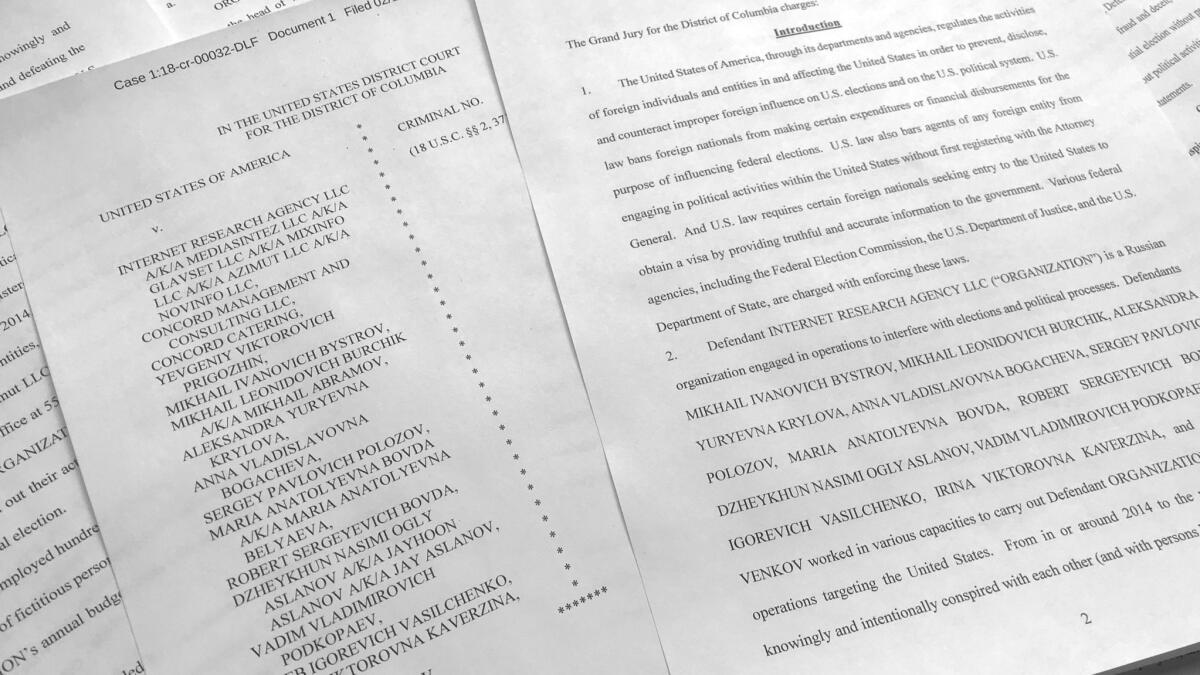Editorial: Protect our elections from Russian (and other) threats

- Share via
In addition to peddling fake news and hacking into email systems, Russia apparently tried but failed to interfere with the machinery of 2016 U.S. elections. No votes were changed, as far as we know, but Russian hackers attempted to invade election systems in 21 states and succeeded in penetrating Illinois’ voter registration database.
The U.S. intelligence community believes that the Russians — and others — will keep trying to interfere with U.S. elections, not only through the dissemination of disinformation but also with continued attacks on computer systems. Testifying before Congress earlier this year about election security, Director of National Intelligence Dan Coats warned that “the United States is under attack.”
Better late than never, Congress is responding to the threat from foreign hackers and targeting other weaknesses in the so-called election infrastructure. That includes not only voting machines but also computer systems used in the tabulation and reporting of results and for voter registration.
It shouldn’t have taken reports of Russian hacking to concentrate Congress’ attention on this longstanding problem.
Last month, both the Senate and the House Intelligence committees called for new initiatives to protect elections from interference, and several senators, including California’s Kamala Harris, unveiled an updated version of the Secure Elections Act. That measure would create a federal-state advisory panel to develop a set of guidelines for election cybersecurity and establish a grant program to help states improve their procedures.
The bill also seeks to improve communications between the states and the federal government about cyberthreats to election systems. State officials, including California Secretary of State Alex Padilla, have complained in the past that Washington hasn’t fully shared information with the states.
Finally, the omnibus spending bill signed by President Trump includes $380 million in grants to enable the states to strengthen the security of their election systems. The funds can be used to reduce vulnerabilities in computer systems and to replace obsolete voting machines.
Welcome as the new spending is, it may not be enough. The Brennan Center for Justice at New Yok University Law School warns that, because the way the funds will be allocated, there won’t be sufficient funds to replace all the country’s insecure paperless systems. Election security experts are virtually unanimous in calling for states that use electronic voting machines to include a paper trail.
That’s one reason Congress needs to pass the Secure Elections Act authorizing additional grants to the states, which, if matched, could lead to the replacement of more voting machines that lack a paper backup. (The grants would have to voted on again in appropriations bills.)
It might seem paradoxical at a time of ever more sophisticated technology that paper records would be the gold standard for accurate voter tallies. Yet, when many voting machines break down, the absence of a paper backup can make it impossible to record an accurate count. Moreover, the knowledge that such a safeguard exists increases public confidence in the integrity of the process and discourages conspiracy theories.
Perhaps in the future, advances in computer security will make paper records obsolete and even make it possible for voters to cast their ballots on their computers or smartphones. For the foreseeable future, however, it’s vital that states have backup paper copies of votes that are cast electronically. As Harris has noted: “Russia cannot hack a piece of paper like they can computer systems connected to the internet.”
Although the Secure Elections Act is aimed at the integrity of federal elections, it would also make elections for state offices more secure, not only from cybersabotage but also from technical malfunctions and human error.
That doesn’t mean, however, that states don’t also have a responsibility to upgrade their voting systems. As part of his budget proposal, Gov. Brown has asked the Legislature to appropriate $134 million for the updating of county voting systems. Other states should also share in the cost of making voting systems more reliable.
It shouldn’t have taken reports of Russian hacking to concentrate Congress’ attention on this longstanding problem. As the Secure Elections Act itself states, safeguarding the integrity of voting systems isn’t just a matter of national security; it’s important because “free and fair elections are central to our democracy.” Expenditures to protect that promise is money well spent.
Follow the Opinion section on Twitter @latimesopinion and Facebook
More to Read
A cure for the common opinion
Get thought-provoking perspectives with our weekly newsletter.
You may occasionally receive promotional content from the Los Angeles Times.









